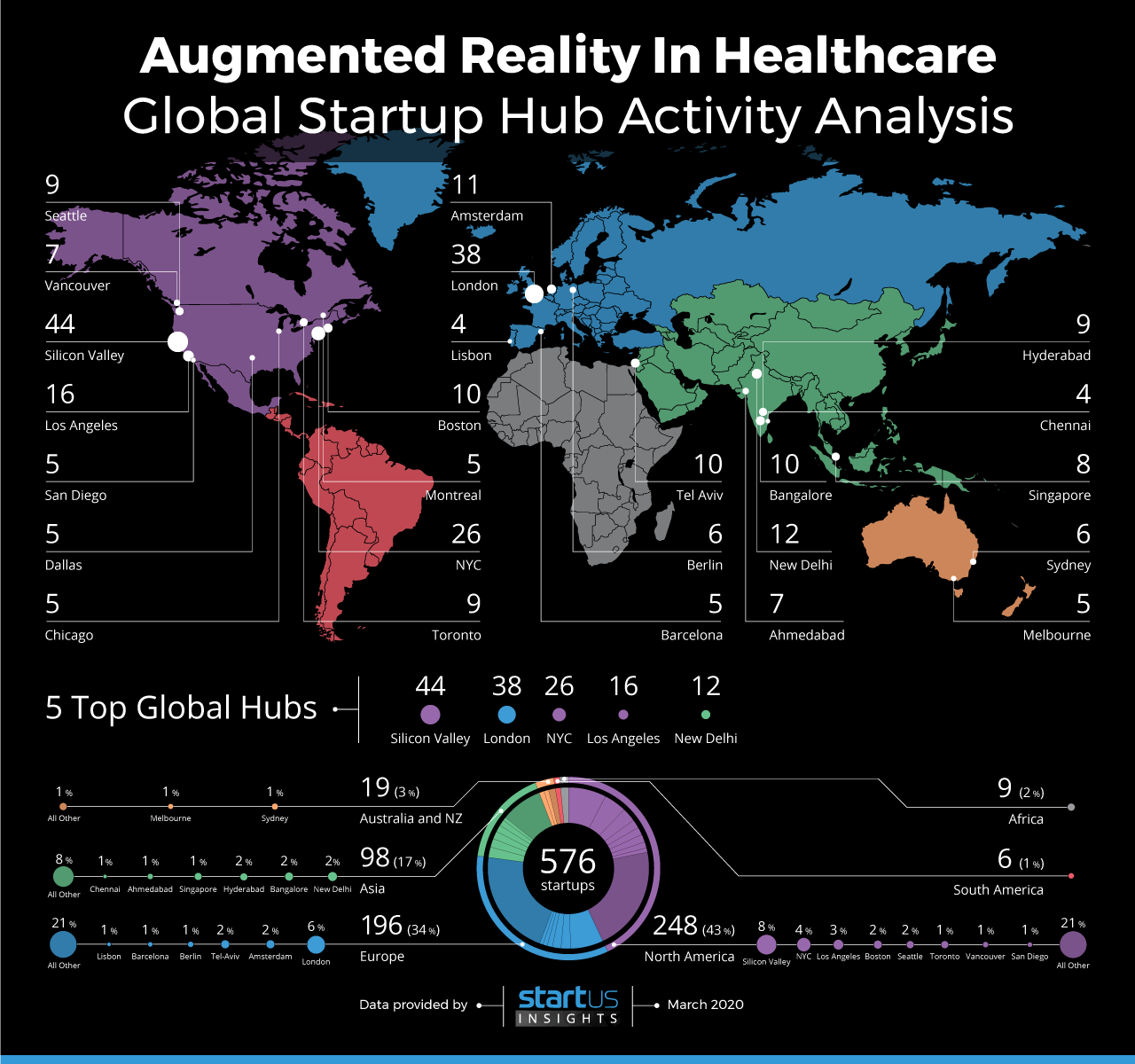The ability to overlay high-resolution medical images during a surgery or operation eliminates avoidable human errors and allows surgeons to operate on more patients with reduced stress levels. Augmented reality (AR) in healthcare, along with virtual and mixed reality technologies, has the potential to redefine disease detection, diagnosis, and treatment. In addition, AR improves learning outcomes through knowledge supplementation and immersive training solutions.
Several challenges lie ahead for the large-scale adoption of AR technologies in healthcare. As it becomes more cost-effective to develop and implement various extended reality solutions, doctors, patients, and students benefit from a higher quality of healthcare and health education.
Top 5 Global Augmented Reality Startup Hubs For Healthcare
Using our StartUs Insights Platform, we analyzed the geographic distribution of global activity in AR in healthcare. We identified 25 regional hubs* that observe increased activity in developing AR solutions in healthcare.
According to our data, Silicon Valley, London, New York City, Los Angeles, and New Delhi are home to 135 startups* and emerging companies and account for 23% of the global activity. Let us have a look at some of the AR startups in healthcare from these 5 top hubs.
According to our data, more than three-quarters of all AR activity in healthcare is observed in North America and Europe. Partly due to higher investments in these regions but also due to low adoption rates of technology in general in other parts of the world. Fifteen percent of all activity in this topic is observed in just three hubs – Silicon Valley, New York City, and Los Angeles.
China, Australia, and India also see an increasing number of startups and emerging companies for AR in healthcare. Emerging economies see the value in adopting technology that reduces overall costs and improves medical training and patient outcomes.
#1 Silicon Valley | 44 Startups & Emerging Companies
Widely considered as the origin of many modern technologies, Silicon Valley boasts a large pool of skilled talent for augmented reality development. In addition, the link between the success of technology and their livelihoods drives a higher number of subscribers for various solutions. With opportunities to network with solutions and developments from several industries, AR startups in healthcare find it easier to find the right kind of clients and partners to work with.
For hospitals and medical staff, soft skills are vital as they sometimes deal with patients who have traumatic or life-threatening injuries and during emergency situations. Virti is a startup based out of San Mateo developing immersive experiential learning solutions. They employ virtual reality (VR) and AR with artificial intelligence (AI) to accelerate employee soft-skills training. The decision-making ability of the user is assessed when managing patients, allowing them to improve or learn for future situations.
#2 London | 38 Startups & Emerging Companies
UK Research & Innovation is the government body pushing research & development (R&D), funding, and networking among a diverse set of startups and companies. Like regulators around the world, privacy and safety concerns hamper full-scale adoption of technologies like AR in healthcare. However, with cybersecurity startups also advancing simultaneously, there is ample opportunity for drawing the benefits of AR.
Operating from London, Backup Reality is a startup developing the Dorothy App – an augmented reality assistant for people with memory problems. The app allows its users to navigate comfortably and reminds them about various tasks and events scheduled for the day. This allows caregivers to monitor their patients from remote locations. The app also ensures that the patients need not operate the AR-enabled device as it will remain turned on always.
#3 New York City | 26 Startups & Emerging Companies
Since 1991, the New York City Economic Development Corporation has strived to create a sustainable and resilient future for residents of all five boroughs of the city. In 2018, they set up RLab, a 16,500 sq.ft of co-working space, classrooms, studios, and labs in the Brooklyn Navy Yard. RLab is one of the nation’s first city-funded centers for research, education, and entrepreneurship in virtual and augmented reality and related technologies.
OpticSurg is a startup from New York City developing mixed reality solutions for healthcare, and in particular, for surgeons. To help improve patient care in the operating room, their mixed reality (MR) system, SURGARAI, combines relevant preoperative information with real-time intraoperative information in a portable and personalized fashion.
#4 Los Angeles | 16 Startups & Emerging Companies
Hollywood is the biggest hub for media and entertainment in the world. Boasting a massive pool of innovative and creative talent, the Greater Los Angeles Area is home to numerous budding startups from many sectors. Along with the gaming industry, the wider public in LA is already aware of various uses of virtual and augmented reality. With a recent focus on advanced manufacturing and healthcare, startups are finding opportunities in developing AR solutions for healthcare.
One of the main reasons for equipping surgeons with AR/MR solutions is to help them to complete operations faster and attend to more patients. Working from Laguna Hills near Los Angeles, Insight Medical Systems develops ARVIS (Augmented Reality Visualization and Information System). It combines tracking cameras with both a 3D display and a handsfree interface in a standalone surgical headset. This solution is pending FDA approval and looks to deliver information to the surgeon right at the point of care.
#5 New Delhi | 12 Startups & Emerging Companies
Even though AR and other extended reality (XR)-based technologies are at a nascent stage in India, we observe that startups focus on the healthcare sector to develop solutions that help doctors and patients. With an uneven public health system, even locally in New Delhi, the potential for improving patient and medical training outcomes using advanced mixed and augmented reality remains very high.
Based out of the Indian capital, Artificial Visual Labs develops a range of technology-based solutions for several industries, including healthcare. Using a combination of AI, machine vision, and the Internet of Things (IoT), they work around clinical research models on a microscopic level. They develop bespoke augmented reality solutions for the industry.
What’s Next?
Led by the media and gaming industries, many people seem to understand what the technology does from the consumer-facing applications of AR and VR. Startups and emerging companies currently develop innovative AR-based solutions for the healthcare sector ranging from training, knowledge supplementation, disease detection, and diagnosis, assisted surgery, and even treatments for mental health issues. Immersive technologies, across industries, are set to redefine the way we interact with our surrounding environment.
*A hub is defined as the regional geographic center of activity for this topic. It covers the center point with a radius of 100km. We define startups and emerging companies as those founded after 2010.










